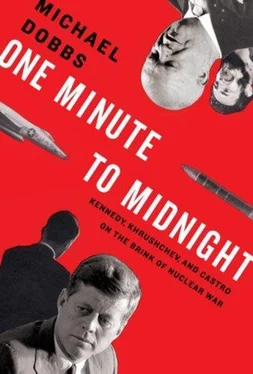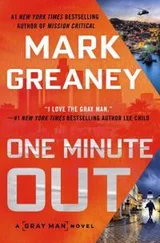“we may not have confused”: Yesin, et al., Strategicheskaya Operatsiya Anadyr’, 219. Author’s interviews with Viktor Yesin, lieutenant engineer in Sidorov’s regiment, July 2004 and May 2006.
Four more missile launchers were stationed: In order to avoid confusion, I have stuck with the CIA designation of Sagua la Grande as the site of Sidorov’s regiment. In fact, his regimental headquarters were seventeen miles southeast of there, closer to the village of Calabazar de Sagua, at 22deg39’N, 79deg52’W. One battalion ( diviziya in Russian) of four missile launchers was stationed near Calabazar de Sagua; the second was between Sitiecito and Viana, six miles southeast of Sagua la Grande.
“Just remember one thing”: Malakhov, MAVI.
“The minute you get back”: Pierre Salinger, John F. Kennedy: Commander in Chief (New York: Penguin Studio, 1997), 116.
A surprise air strike: Minutes of October 20,1962, ExComm meeting, JFK2, 601-14.
“Gentlemen, today”: Stern, 133. See also Brugioni, Eyeball to Eyeball, 314, and Reeves, 388.
“My fellow Americans”: Havana 2002, vol. 2. The author of the air strike speech has not been identified, but circumstantial evidence including the formatting suggests that it was written by Bundy or one of his aides.
“We are very, very close”: Theodore C. Sorensen, Kennedy (New York: Harper & Row, 1965), 1-2; Theodore Sorensen OH, 60-66, JFKL.
the “highest national urgency”: Salinger, John F. Kennedy, 262.
“They’ve probably discovered”: Sergei Khrushchev, Nikita Khrushchev: Krizisy i Rakety (Moscow: Novosti, 1994), 263, author’s translation.
“It’s a pre-electoral trick”: A. A. Fursenko, Prezidium Ts. K. KPSS, 1954-1964 (Moscow: Rosspen, 2003), Vol. 1, Protocol No. 60, 617, author’s trans. English translations of the Presidium protocols are available through the Kremlin Decision-Making Project of the Miller Center for Public Affairs at the University of Virginia.
“If they were to use”: Sergo Mikoyan, Anatomiya Karibskogo Krizisa (Moscow: Academia, 2006), 252. Aleksandr Fursenko and Timothy Naftali attributed this quote to Mikoyan rather than Khrushchev in Khrushchev’s Cold War: The Inside Story of an American Adversary (New York: W. W. Norton, 2006), 472. They subsequently said they made a mistake. Sergo Mikoyan is the son of Anastas Mikoyan. His book includes extensive citations from notes made by his father in January 1963, three months after the missile crisis, which are now in his possession.
“He’s either all the way”: Taubman, xx.
“enough emotion”: James G. Blight and David A. Welch, On the Brink: Americans and Soviets Reexamine the Cuban Missile Crisis (New York: Farrar, Straus & Giroux, 1990), 329.
It was “only natural”: Nikita Khrushchev, Khrushchev Remembers: The Last Testament (Boston: Little, Brown, 1974, hereafter NK2 ), 510.
“The tragic thing is that”: Presidium Protocol No. 60.
Khrushchev was proud of his humble roots: Taubman, xvii.
“like the old joke”: Andrei Sakharov, Memoirs (New York: Knopf, 1990), 217.
“Not strong enough”: Reeves, 166.
“young enough to be”: See, e.g., William Knox’s account of his visit to Khrushchev, October 24, 1962, JFKL.
“a merciless business”: NK2, 499.
“America recognizes only”: Gribkov et al., U Kraya Yadernoi Bezdni, 62.
“How can you say that”: Blight et al., Cuba on the Brink, 130.
“Your voice must impress”: Fursenko and Naftali, Khrushchev’s Cold War, 416.
“their own medicine”: Aleksandr Alekseev, “Karibskii Krizis,” Ekho Planety, 33 (November 1988).
“the same shit”: Fursenko and Naftali, Khrushchev’s Cold War, 413.
“I see U.S. missiles”: John Lewis Gaddis, We Now Know: Rethinking Cold War History (New York: Oxford University Press, 1997), 264.
“Now we can swat”: FRUS, 1961-1963, Vol. XV: Berlin Crisis, 1962-1963, 309-10.
the “best kept secret”: Sorensen OH, JFKL. The thirteen full members of the ExComm were President Kennedy, Vice President Lyndon Johnson, Secretary of State Dean Rusk, Secretary of the Treasury Douglas Dillon, Secretary of Defense Robert McNamara, Attorney General Robert Kennedy, National Security Adviser McGeorge Bundy, Director of Central Intelligence John McCone, Chairman of the Joint Chiefs Maxwell Taylor, Under Secretary of State George Ball, Ambassador-at-Large Llewellyn Thompson, Deputy Secretary of Defense Roswell Gilpatric, and Special Counsel Theodore Sorensen. Several other aides were invited to attend ExComm sessions on an ad hoc basis. (National Security Action Memorandum 196, October 22,1962.)
“How long do I have”: Walter Isaacson and Evan Thomas, The Wise Men (New York: Simon & Schuster, 1986), 631.
By Monday afternoon: Cuba Fact Sheet, October 27, 1962, NSAW.
“Call Operator 18”: Reeves, 392.
“A great nation”: Dean Acheson OH, JFKL.
“by an inadvertent act”: Air Defense Command in the Cuban Crisis, ADC Historical Study No. 16, 116, FOIA. See also sections on 25th and 30th Air divisions.
“the dumbest weapons system”: June 2002 e-mail to the author from Joseph A. Hart, former F-106 pilot.
“booming off the runway”: ADC Historical Study No. 16.
“If they want this job”: Beschloss, 481.
“clearly in a nervous”: Dobrynin cable, October 22, 1962, CWIHP, 5 (Spring 1995), 69. Dean Rusk, As I Saw It (New York: W. W. Norton, 1990), 235.
“Is this a crisis?”: WP, October 23, 1962, A1; Beschloss, 482.
“This is not a war”: Fursenko and Naftali, Khrushchev’s Cold War, 474.
“We’ve saved Cuba”: Oleg Troyanovsky, Cherez Gody y Rastoyaniya (Moscow: Vagrius, 1997), 244-5.
The 11,000-ton Yuri Gagarin: I have reconstructed the positions of Soviet ships on October 23 from CIA daily memorandums for October 24 and 25, NSA intercepts, plus research in Moscow by Karlov. See also Statsenko report.
Her cargo included: Yesin et al., Strategicheskaya Operatsiya Anadyr’, 114.
After a sixteen-day voyage: For the positions of the Aleksandrovsk and Almetyevsk, see NSA Cuban missile crisis release, vol. 2, October 1998.
In addition to the surface ships: Svetlana Savranskaya, “New Sources on the Role of Soviet Submarines in the Cuban Missile Crisis,” Journal of Strategic Studies (April 2005).
The vessels closest to Cuba: The ships that continued to Cuba were the Aleksandrovsk, Almetyevsk, Divnogorsk, Dubno, and Nikolaevsk, according to CIA logs and Karlov research.
“In connection with”: Havana 2002, vol. 2, Document 16, author’s trans.
“Order the return”: Fursenko, Prezidium Ts. K. KPSS, 618-19.
“caught literally with his pants”: Nikita Khrushchev, Khrushchev Remembers (Boston: Little, Brown, 1970, hereafter NK1 ), 497; Troyanovsky, 245.
“He is a genuine revolutionary”: Aleksandr Fursenko and Timothy Naftali, One Hell of a Gamble: Khrushchev, Castro, Kennedy and the Cuban Missile Crisis, 1958-1964 (New York: W. W. Norton, 1997), 39.
“He made a deep”: NK2, 478.
“like a son”: Blight et al., Cuba on the Brink, 190.
the code name AVANPOST: Fursenko and Naftali, One Hell of a Gamble, 55.
“He had a weakness”: Blight et al., Cuba on the Brink, 203.
“Are you or are you not”: Fursenko and Naftali, One Hell of a Gamble, 29, quoting interview with Alekseev.
Читать дальше












